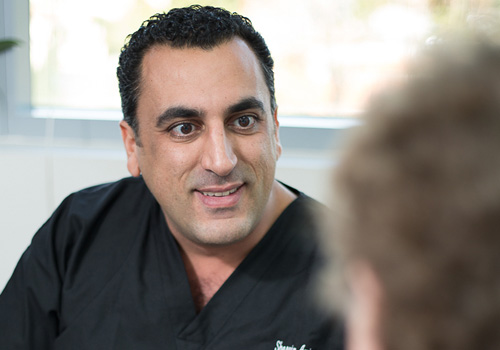Allergy Testing
People all over America experience the signs of allergies: nonstop sneezing, sinus headaches, runny noses and watery eyes. When a person is prone to allergies, these can attack at any time and sometimes during the worst circumstances. If this sounds familiar to you, it’s possible that you are allergic to something that is routinely in your environment, such as pet dander, plants or dust mites. Los Angeles allergy doctor, Shervin Aminpour, attacks allergies viciously by first finding the exact cause. From there, treatment is usually a breeze, giving patients total relief from their allergy symptoms.
However, the symptoms commonly associated with allergies may actually indicate another condition entirely. As an example, chronic sinusitis produces headaches, postnasal drip, runny nose and sneezing. At first glance, this is clearly an allergy, especially since that is a condition people are generally more familiar with. However, sinusitis is very different from allergies and must be treated in a different fashion. Therefore, when it comes to allergy testing, the first step is to find out if it’s an allergy in the first place.
Diagnosis
The first step is a consultation with our Los Angeles ENT doctor, Dr. Aminpour. During this time, he places a strong emphasis on a 100% accurate diagnosis, as this is what will allow proper treatment to occur. He will take all the time necessary to be certain of the source of your symptoms. In some cases, he may find that the cause is not an allergy at all, but rather some other condition. In either case, diagnosis is the first crucial step on the road to recovery.
If your condition is an allergy, Dr. Aminpour will perform further testing to find the exact allergen and how your body reacts. In this way, he can recommend treatment that not only eliminates the allergy symptoms, but also helps prevent future allergies from occurring.
If you are experiencing symptoms relating to the ear, nose and throat, Dr. Aminpour is here to help. As a board-certified otolaryngologist, he can diagnose and treat the entire spectrum of ENT conditions. If you think your child may have allergies, don't hesitate to contact us, as Dr. Aminpour specializes in pediatric ENT services and can diagnose this condition in your child. Please give us a call at any time, and we will answer your questions or set an appointment.
Why You Should Work With a Doctor
Home test kits are available that allow you to test yourself for allergies. You may be tempted to try a home test, but these tests only identify a small number of the most common allergens. If you struggle with uncomfortable or possibly life-threatening allergic reactions, get help from Dr. Shervin Aminpour.
If you have an allergy, it is more than an annoyance. It’s a medical condition. Like any other medical condition, it exists in the context of a living organism with a beautiful and complex set of systems that work together.
If you want to get to the bottom of why you are having an allergic reaction get help from Dr. Shervin Aminpour. An evaluation of your medical history is the first step in diagnosing the source. Dr. Aminpour has the experience and knowledge to help you identify the source of your uncomfortable (and possibly dangerous) allergic reaction. You can be fully confident that he has the skills and knowledge to accurately interpret test results and develop a treatment plan.
Types of Allergy Tests
There are two main types of allergy tests: skin tests and blood tests.
Skin tests are the easiest and quickest option, and in many cases, are the test of choice. A blood test can be used to confirm the results of a skin test that is inconclusive, to help us find out more about what is triggering an allergic reaction, or if you are so allergic to something that even a small exposure could cause a potentially dangerous reaction.
Skin Tests
There are several types of skin tests. The common denominator of them is that, in one way or another, they involve exposing your skin to an allergen and observing it for a reaction.
These tests are generally done on the inside of your forearm, or son your back. The variations include:
- A Skin Prick Test – Your doctor will put a drop of a solution containing an allergen – e.g., pollen or animal hair – on a marked position on your skin. Your skin is pricked with a lancet so that the allergen can enter it. If you’re testing for a food allergy, the lancet can be dipped into that food. A small bump will form on your skin, or it will become red, if you are allergic to the substance being tested.
- An Intradermal Test – In this case, the allergen is injected into the skin. This can be more uncomfortable than a skin prick and can potentially trigger a larger reaction. In generally, it is used only if the response to the skin prick was inconclusive.
- A Skin Scratch/Scrape Test – This test involves cleaning your skin, marking and labelling an area, and placing a drop of an allergen with the marked zone. Then the skin is scratched lightly (no bleeding) to allow the allergen to enter the body.
- External Application – It may be that your doctor has reason to suspect that you might react strongly to a particular allergen, it may be sufficient to simply rub it onto your arm without breaking the skin.
As you can deduce from the nature of these tests, the results, whether positive or negative, are immediately visible.
Blood Testing
There are several reasons why a blood test might be more appropriate than a skin test.
- You might be taking a medicine that would interfere with skin testing. (Another reason to work with a doctor, as they will know what medications fall into this category.)
- You have a skin condition such as psoriasis or eczema.
- There is reason to suspect that skin testing would cause a reaction that poses a potential health risk.
How is Blood Testing Done?
The procedure for blood testing for allergies proceeds like a standard blood test. Blood is drawn and sent to a laboratory for analysis. The evaluation of the blood sample reveals the quantity of allergen-specific antibodies present in your blood. Blood tests can be a valuable method in diagnosing specific food allergies.
Find Out What’s Really Going On
Patients in Los Angeles are fortunate to have access to Dr. Shervin Aminpour, our board-certified ear, nose, and throat specialist (ENT) who has a comprehensive understanding of the diagnosis and treatment of allergies. If you been plagued by symptoms that are impacting your quality of life, schedule a consultation. Find out what’s been causing your allergic reaction with an accurate diagnosis, and a treatment plan to resolve the condition.




